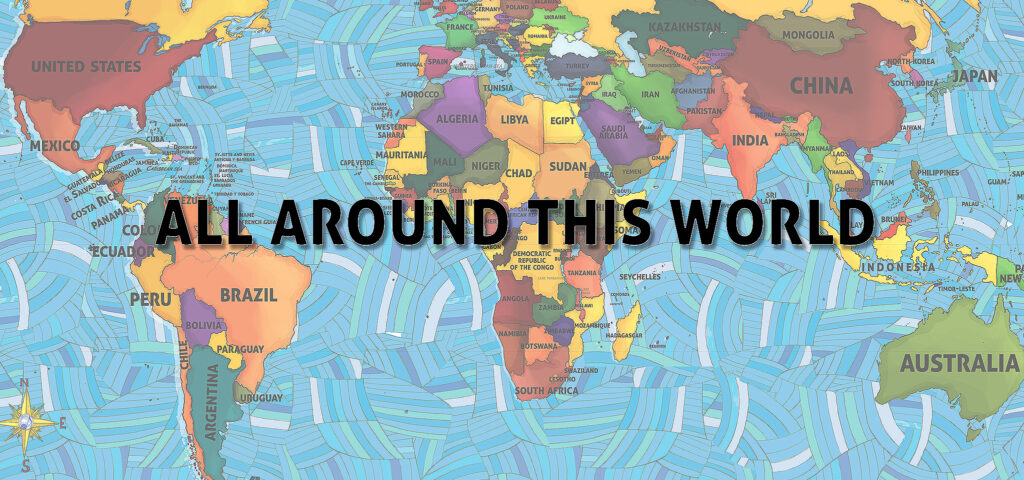The Society Islands are composed of two distinct island groups: the Windward Islands, including Tahiti, and the Leeward Islands. Tahiti is the largest, most populous and most politically central island in the Society Islands, and in fact in all of French Polynesia. Tahiti is a volcanic island that has a mountainous center surrounded by coral reefs. Most of the approximately 175,000 people (2007 estimate) who live on Tahiti live in the capital city of Papeete. Of the citizens of Papeete, about 70% are Polynesian while the rest are European, Chinese or Tahitians of mixed European/Polynesian descent known as “Demis.”
The first inhabitants of Tahiti were Polynesians who arrived between about 300 and 800 CE, having traveled thousands of miles across the Pacific from island groups like Fiji, Samoa and Tonga. As on many Polynesian islands, Tahitian society is organized based upon a complex interplay of chiefdoms, clans and the power dynamics between them. In Tahiti, clan leaders were powerful but not all-powerful; they generally made decisions in consultation with general assemblies. Tahitian culture had a strong oral tradition involving an extensive mythology based on tales about various gods, as well as extensive traditions surrounding tattooing and navigation. Most public spiritual ceremonies took place in “marae,” which were sacred places of worship made of raised stone platforms. People prayed to gods in marae, enthroned leaders, prepared for war, celebrated births and conducted funerals.
The first European to visit Tahiti was British sea captain Samuel Wallis who appeared in 1767 and claimed it for England, followed soon thereafter by French explorer Louis Antoine de Bougainville, who not only claimed Tahiti for the French, but published accounts of his travels in which he described Tahiti as a utopian paradise populated by “noble savages,” far away from the corrupting influence of civilization. Missionaries from the London Missionary Society arrived in in 1797 and claimed Tahiti for Christianity.
In 1788, perhaps in response to the European incursion, this fine fellow—King Pōmare I, also known as Otou–united the various Tahitian clans into the Kingdom of Tahiti. He and his descendants ultimately came to exert influence over all of the island groups that compose French Polynesia.
Despite the solidifying of a Tahitian kingdom the people of Tahiti faced hard times in the early days of European exploration. Not only did Tahitians first become acquainted with guns and alcohol, but a substantial proportion of Tahitians fell victim to European-introduced diseases such as typhus, smallpox and influenza. The population fell from tens of thousand to about 6,000 in the 1800s.
The Pōmare kingdom passed from father to son (Pōmare II), then father to his 18 month old son (Pōmare III) who officially held the throne until he passed away at the age of six. The throne then went to his 14 year old sister, Pōmare IV, who ruled Tahiti for 50 years (1827-1877). Pōmare IV fought French intervention for almost two decades but in 1843 finally agreed to administer the French protectorate. In 1880 the French forced her son, Pōmare V, to abdicate the throne. In 1946 France made all of French Polynesia an “overseas territory” and granted Tahitians French citizenship. In 2003 French Polynesia became an “overseas collectivity” and in 2004 it transformed into “an overseas country.” (What’s the difference? Wikipedia tells us.)
INDEPENDENCE OR BUST? TEMARU, FLOSSE, SANG and THE NEXT TAHITIAN KING:
Should Tahiti remain an official part of France or should it become independent? Should Tahiti bring back the king? Over the last several decades debates over the question of independence have been central to Tahitian politics. Since 2004 the presidency of French Polynesia has switched hands several times between pro-independence leader Oscar Temaru, members of the pro-France, pro-Tahitian autonomy Tahoera’a Huiraatira party, led by long-term French Polynesian president Gaston Flosse, and former Tahoera’a Huiraatira leader, Tong Sang, who fell out of favor with his party, and even fell victim to a coalition formed by Temaru and Flosse. Most every time power switched hands a no-confidence vote would follow, and then new elections. (Since 2004 Temaru has been president of French Polynesia five times.) France has annulled the results of French Polynesian elections, censured the Temaru governments and even sent riot police to Tahiti “to prevent the ‘dismemberment of the republic.'” In the midst of this continued confusion, Tauatomo Mairau, a descendant of the Pōmare kings, has tried to restore the Tahitian monarchy via the French Polynesian courts. In 1993 the French government disclosed that it had illegally confiscated a substantial amount of Tahitian royal land when it annexed Tahiti from Pōmare V in 1880. Since then Mairau has won several court battles proving his lineage and continues to assert his right to ascend the throne and reclaim the land. Joinville Pōmare and Leopold Pomare have also asserted hereditary claims to the nonexistent Tahitian throne. As of early 2012, all three are on Wikipedia’s “list of pretenders.”
More information:
Wikipedia on Tahiti | Tahiti1.com introduces you to Tahiti, giving practical travel and tourist information about the island as well as features like recipes for Tahitian dishes like “Pork Curry With Tarua (taro)”, “Banana Poe” and “Coconut Chicken with Fafa”| The World Socialist Web Site reported on the French Polynesian political crisis in 2005: “Pro-independence parties topple government following Tahiti by-election” | Read the Pacific Islands Report’s 2009 report on the political crisis: “French Polynesia at Loss for Political Leadership” | More about Tauatomo Mairau and his claims to the Tahitian throne | In 2006 the French admitted Tahiti and other French Polynesian island faced fallout from their nuclear tests | Want to go on a wonderful vacation in the Society Islands? Have a zillion dollars? Try Bora Bora.
[mappress mapid=”15″ center=”-17.5, -149″ zoom=”8″]
MUCH TAHITIAN MUSICAL CONTENT TO COME.


Comments are closed.